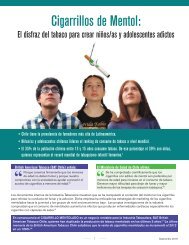Public health successes and missed opportunities
Public-health-successes-and-missed-opportunities-alcohol-mortality-19902014
Public-health-successes-and-missed-opportunities-alcohol-mortality-19902014
You also want an ePaper? Increase the reach of your titles
YUMPU automatically turns print PDFs into web optimized ePapers that Google loves.
<strong>Public</strong> <strong>health</strong> <strong>successes</strong> <strong>and</strong> <strong>missed</strong> <strong>opportunities</strong><br />
The main conclusion of the current study for alcohol policy is clear: if governments do not initiate policies to reduce<br />
alcohol consumption in societies with a large number of heavy drinking occasions, a disproportionate burden of alcoholattributable<br />
morbidity <strong>and</strong> mortality will result. Reduction in alcohol consumption among heavy drinkers plays a key role.<br />
If proven effective policies such as reduction in availability, increase in price via taxation, <strong>and</strong> ban on marketing <strong>and</strong><br />
advertisements do not work out to be feasible, reducing the consumption of the heaviest drinkers via brief interventions<br />
or treatment could have a population <strong>health</strong> impact (202,244) (see also (159,245)). 21 In most of the other countries of the<br />
WHO European Region, governments should be aware of the fact that the current level of alcohol consumption is in no<br />
way acceptable from a public <strong>health</strong> perspective <strong>and</strong> associated with considerable harm, <strong>and</strong> thus they should continue<br />
or initiate successful measures to reduce alcohol consumption. Moreover, governments should be aware of the fact that<br />
wrong policies could lead to substantial harm in a relatively short time (10,156).<br />
No matter what policies the respective governments choose, reducing the alcohol-attributable burden of mortality in<br />
Europe is an urgent matter. It is needed to reduce not only individual suffering <strong>and</strong> harm to others around the drinker, but<br />
also the economic burden attributable to alcohol (77,247,248).<br />
To summarize, although alcohol consumption has been decreasing in the WHO European Region as a whole over the<br />
past 25 years, it continues to be a major risk factor for mortality, <strong>and</strong> the overall alcohol-attributable mortality burden<br />
increased slightly over this time period. The major contribution to the increased mortality burden came from eastern<br />
European countries, in which the alcohol-attributable mortality rates increased substantially. Alcohol policy measures to<br />
reduce the mortality burden are urgently needed, <strong>and</strong> while they are the most urgent in the eastern part of the Region,<br />
most other countries could rapidly be faced with a larger alcohol-attributable mortality burden if they do not continue to<br />
decrease their overall level of alcohol consumption <strong>and</strong> occasions of episodic heavy drinking. (As an illustration, see how<br />
the alcohol-attributable mortality rates increased in the United Kingdom when this nation increased consumption in the<br />
1990s.) Given the overall failure in reducing the alcohol-attributable mortality burden in the WHO European Region in the<br />
past 25 years, despite the existence <strong>and</strong> promotion of traditional evidence-based <strong>and</strong> cost-effective interventions, some<br />
rethinking seems necessary on introducing additional alcohol policies.<br />
21<br />
There are other evidence-based ways to impact on heavy drinkers specifically, such as rationing schemes (246) or the above-cited sobriety enforcement (224,235),<br />
but realistically, brief interventions <strong>and</strong> treatment will be the most discussed policy options in the current environment of the WHO European Region (9).<br />
62




